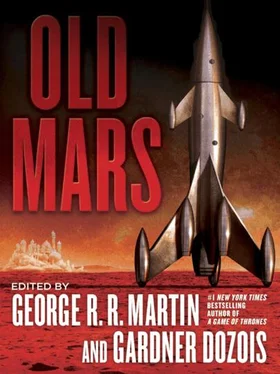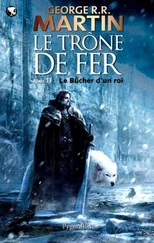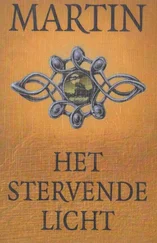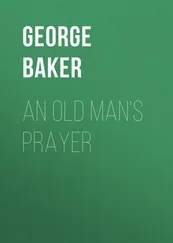“Madam,” I said, “your optimism is misplaced.”
In my worst moments, Majesty, I can still see the surprise and the hurt in Carina Meer’s expression at my gruffness. I think she might have gone on, pressed me to better explain myself, but I rolled my back to her and kept my own counsel instead. For a time I lay thus, pouting for my wounded masculine pride and regretting bitterly that I had ever come across the Vargud van Haarlem . Nor would I report this to you now had not this conversation had some bearing on the issue that has prompted me to deliver this account to you. Indeed, even so, I was sorely tempted to omit it. Whatever sins may remain marked against my soul, I can at least claim that a lack of candor is not among them.
“Captain Lawton, sir?” Mister Kopler said, his voice pulling me back to myself. I was astonished to find there were tears in my eyes. I coughed and wiped them away as best I could against my shoulder.
“Mister Kopler,” I said. “You’ve freed your hands, then?”
“Yes, sir.”
“You win this time,” Mister Darrow said, grudgingly. “I got a cramp in one thumb, or I’d have beat him, sir.”
“Let us hope there will be no call for a rematch in our immediate future,” I said. “For now, make haste. We have a ship to recapture.”
Boarding and taking a ship requires a very different logic than reclaiming one from within its own brig. In the first instance, all sides are armed, and all know the battle has begun. In the second, customarily speaking, only one side has the advantage of weapons and the other the knowledge that the struggle exists. Of the two, I much prefer the direct battle, not because I disdain stealth, but because weaponry is robust and surprise fragile. Once an alarm is raised, the usual balance is restored, and rarely to the benefit of the escaped prisoners. The first guards to come to us—an Ikkean spider-beast and two grenadiers in the governor’s service—we overcame quickly and without incident, and with their weapons, we stole forth into the ship that had been our own. The brig in which we had been imprisoned lay far to the stern, a good distance from the bridge, but not from either the hold where the precious Incan alloy was stowed or from the vast engines that acted as mast, sail, and rudder to the Serkeriah . Time was short, and Captain Carina Meer took one force to the hold while I took the other to capture the engines. It might have seemed natural that each of us should take their own, but in practice, both groups were made from the crew of the Dominic of Osma and the Serkeriah in nearly equal proportion.
I wish I could say that the assault upon the engines went without fault, but the great, throbbing mechanisms—a dozen in number and each larger than a ship of the line—were encompassed by passages and cul-de-sacs so convoluted and complex that there could be no clean fight. Several times, I found myself cut off from my men, in desperate melee with the black grublike beings larger than a man that the Ikkeans used as slaves on their ships. I did not know for several months the origin of those repulsive half insects, and now that I have learned it, I wish I had not. Somewhere in the fury of battle, an alarm was raised, and our advantage evaporated.
When Carina Meer arrived with the alloy on a floating cart, the Ikkean soldiers were already on their way. The combined intelligence of Doctor Koch and Octus Octathan devised a temporary barricade by restricting the passageways leading to the engines down to the diameter of a coin, but by blocking the means of ingress, they had also stoppered our hope of escape. I saw no salvation, but I kept all despair from my demeanor. I walked the defenses, giving heart and cheer where I could. What few weapons we had reclaimed we trained upon the narrowed halls, and through the thin passages we heard the voices of men, the chittering of great spiders, and at last the slow, deep gnawing of a new passage being ground out.
When I returned to deliver the foul news to Carina Meer, she stood at another of the floating charts of light such as I had seen her use on the bridge. Only here, instead of the bright mark of the Serkeriah surrounded by the ruddy glow of the Ikkeans, the ship stood alone but spiked through with the enemy until she looked like nothing so much as the back of a cat covered in burrs. And curving below, the vast convex surface of Mars itself.
“We are trapped, and the enemy coming,” I said.
“The Ikkean ships have all attached to the Serkeriah ,” she said.
“I am sorry to hear it,” I said.
“It may yet work to our advantage,” she replied, then reached into the play of light and volume to indicate a feature on the face of the world I had not noticed. It seemed hardly larger than a child’s thumbnail, but it was gray amid the redness of the world. “This is the Palace of the Underworld, the fortress and gateway to the caves in which my people survive. This is where my brother waits now, and where I must deliver the alloy if there is to be any hope of freedom for my people.”
“Carina,” I said, for by now I had no hesitation in using her Christian name, “unless we are to carve a window in the flesh of the ship and drop it from here, I cannot see how this can be done.”
I have never understood, not then and not now, how a woman’s expression can be at once so very serene and utterly reckless.
“Directly,” she said.
Mourn, Your Majesty, for the doomed Serkeriah . There was no nobler ship on sea or in sky than her, and we, her displaced and desperate crew, spiked her rudder. By the time the Ikkeans understood our dreadful intent, it was too late. The evil, parasitic ships tried to disengage, but the speed and violence of our descent confounded them. What few made the attempt were shattered in our fiery wake. The others clung tight and were smashed against the planet’s rocky skin even as we reversed the shrieking engines and slowed from a fatal speed to one merely apocalyptic.
The Serkeriah died around us, the great crystalline plates shearing away as she bounced. One of the enormous engines came loose from its moorings and streaked off ahead of us before turning up toward the purple sky and detonating. The wind that beat against me smelled of overheated iron and tasted of blood. When the great ship lifted her head one last time toward the doubled moon, then came to rest, spent, destroyed, and noble as a bull defeated in the Spanish ring, Carina Meer’s hand was in my own. Somewhere in the indigo shards and twisted metal, the wooden bones of the Dominic of Osma also lay. To the best of my knowledge, they remain there still, our two ships, nestled together in sacrifice and death like the knuckles of a husband and wife strewn in the same grave, and around them the bodies of their fallen enemies.
Unsteady after the wreck, I clambered out to the wide, red dunes of the planet. We had fallen not far from one of the great ruined cities. Its spires and towers reached toward the sky, lightning still playing about their outstretched tips. A great canal, wider than any river save the God-like Amazon, curved to the south, the waters low against its walls, black and sluggish. Carina Meer came to my side, her arm on my shoulder.
“One day,” she said, “I will make all of this bloom. I swear it.”
It was frantic work, preparing this last leg of our journey. Half of our remaining crew manned improvised barricades, keeping the Ikkean survivors of the wreck at bay with Martian ray pistols and their own good steel blades. The other half gathered the Incan alloy that had been scattered by the wreck and rigged the now crippled floating cart on which it had rested. One corner of the failing platform dragged a trail in the dust when they moved it. Doctor Koch tended to the wounded and La’an said words over the fallen. As the sun rose among the vast ruins of the Martian city, we affixed ropes to the listing cart, and, with the straining muscles of our bodies, we began to haul our cargo toward the horizon. How strange it felt to breathe air no man of Earth had ever breathed, to feel the dreamlike lightness of my flesh and dig my feet into the ruddy soil of another world. We had traveled farther than any subject of the empire had ever gone, farther even than the great general of Macedon whose name I bear could have dreamed, across the starry void, driven by powers too vast to contemplate. And still the fate of our mission rested on the effort of strong English backs and the willingness of men as unalike as a baboon from a bumblebee to make common cause. Our goal, the Palace of the Underworld, loomed in the distance, gray and massive and wreathed by ghostly flames of St. Elmo’s fire.
Читать дальше












